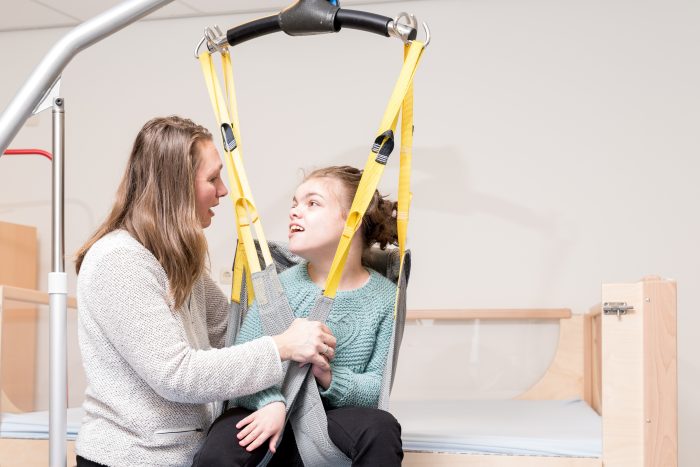The NDIS (National Disability Insurance Scheme) is for the continued care and wellbeing of anyone with a substantial, ongoing disability (a participant).
With an annual budget of more than $35bn, it is jointly governed and funded by the Federal government and participating state and territory governments.
An independent statutory agency known as the National Disability Insurance Agency (NDIA) administers the NDIS, working towards the goal of supporting a better life for hundreds of thousands of Australians with a permanent disability, their families and carers. This agency provides information and referrals, links to services and activities, individualised plans and where necessary, funded support to people over a lifetime.
How does the NDIS work?
The NDIS provides funding for people with permanent disabilities.
Australia-wide, specialist disability services now function under this single NDIS umbrella, with service providers, support coordinators and plan managers helping to implement and manage the services and funding for each participant.
To get funding through the NDIS, a person (or their representative) needs to apply to the NDIA. The NDIA will also require evidence of a person’s age, Australian citizenship, residence and disability before approving funding.
If a person is approved for funding by the NDIA, they become a participant and their NDIS plan will be a written agreement as to the types of support and services for which they will receive funding.
Support funded by the NDIS
The NDIS funds a range of support services for participants, including care, community participation, and accommodation. Some of the options include:
- Full or part-time carers to assist with daily activities
- Transport to and from daily activities, community events or therapy
- Physical and behavioural therapy
- Assistance with household tasks, such as cooking and cleaning.
- Accommodation, including regular accommodation and short stay/respite accommodation
- Property modifications and alterations to support independent living
- Modification to vehicles
- Mobility or therapeutic equipment
- Workplace support to assist in gaining or maintaining employment
Who can access the NDIS?

To be eligible for the NDIS you must:
- Be an Australian citizen or hold a Permanent or a Special Category visa
- Be aged between 7 and 65
- Have a permanent disability
Eligibility and medical conditions
A person may satisfy the NDIS access requirements regardless of whether their impairment came about through birth, disease, injury or accident.
To be eligible for NDIS funding, the disease or medical condition must cause permanent impairment (physical, intellectual, cognitive, neurological, visual, hearing or psychosocial), resulting in significant disability.
List A medical conditions
People diagnosed with List A medical conditions are likely to meet the disability requirements because these conditions, by their very nature, are considered to cause permanent impairment and disability resulting in substantially reduced functional capacity.
Severe conditions include cerebral palsy, spinal injury, brain injury, amputation of two limbs, and total blindness.
List B medical conditions
People diagnosed with List B medical conditions are considered likely to have a permanent impairment. However, as the severity of the impairment is variable, they will need to demonstrate that as a result of their impairment, an ongoing level of care is required. Conditions include chromosomal abnormalities, physical impairments, neurological impairments and many more.
Types of NDIS organisations

Considering the NDIS supports more than 500,000 Australians with disabilities, it takes a range of organisations for the system to function. Many NDIS providers and disability service workers may have considered these factors before joining the industry and choosing an appropriate role.
Providers
Registered NDIS providers are registered under section 73C of the NDIS Act 2013. These types of organisations assist participants with the wide range of services described previously. It is important to note that registration with the NDIS is not mandatory for providers.
Some providers are not registered with the NDIS. Unregistered providers usually provide lower-risk services such as property maintenance and cleaning, and these types of organisations often serve both NDIS and non-NDIS customers.
Support Coordinators
Support coordinators help with sourcing providers and coordinating the support provided to an NDIS participant. Often when an NDIS participant requires assistance, it can be confusing or difficult to find the right provider, this is where a support coordinator can help.
Support coordinators can also coordinate the provision of a participant’s care, this could include booking and managing therapists, transport, daily care, etc.
Plan Managers
Plan Managers help administer NDIS funding on behalf of a participant. This includes paying providers, tracking supports and budgets, claiming funds from NDIS and adhering to the NDIS pricing limits.
Compliance requirements for NDIS organisations
As the NDIS is funded by public money, there are various compliance requirements for organisations to become, and maintain their NDIS registration. The full list of requirements is provided by the NDIS, these include:
- Complying with NDIS practice standards
- Complying with the NDIS code of conduct
- Having an in-house complaints management and resolution system
- Having an in-house incident management system, and notifying the NDIS commission if a reportable incident occurs
- Meeting behaviour support requirements if applicable.
Some of these requirements can be onerous for organisations to fulfil manually. For example, here are some common funding mistakes NDIS providers make, which can be mitigated by using the right software system. The consequences of not meeting these requirements are significant. Using NDIS client management software like CTARS can make compliance much easier.
NDIS software can help your organisation by:
- Recording, storing and managing data for participants for a wholistic view of their goals and progress
- Generating reports required by NDIA to support compliance and ongoing participant support
- Providing a centralised incident management system with automated reporting and alerts
- Supporting timely payments with reduced errors
Conclusion
The NDIS supports more than 500,000 Australians with disabilities and requires a range of organisations for it to function. Registered NDIS providers, support coordinators and plan managers all play important roles in delivering care to participants.
For organisations to remain compliant with the NDIS there are various requirements that need to be met. Using client management software like CTARS, which is tailored for the NDIS can help organisations meet compliance requirements easily and efficiently.








